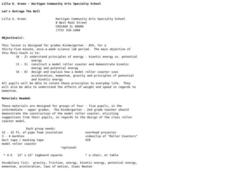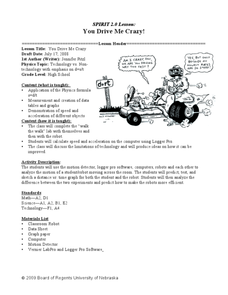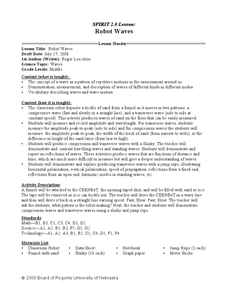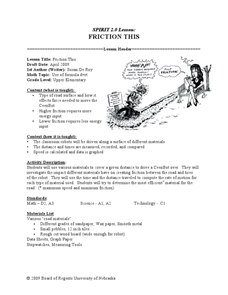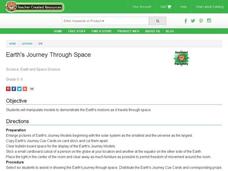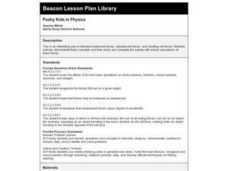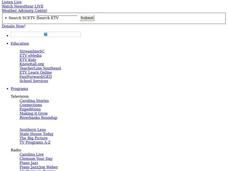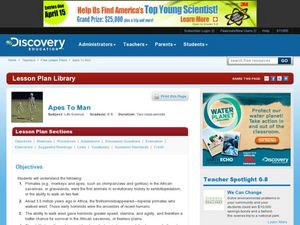Curated OER
Let's Outrage the Bull
Students study kinetic and potential energy. In this energy lesson, students in grades K-2 understand the differences between kinetic and potential energy. Students in grades 3-5 demonstrate that kinetic and potential energy. Students in...
Curated OER
Principles of Flight: Bernoulli's Lift
Students discover how air pressure effects flight. In this physics lesson, students create two types of airplane wings so they can observe the way air pressure creates lift. Students utilize a printout to create the airplane...
Curated OER
Boomerangs Keep Coming Back
Students investigate the flight of paper boomerangs. In this flight lesson, students examine the flight variables of paper boomerangs, which they make, by investigating the concepts of lift and drag. They examine what happens when an...
Curated OER
Flight Paths of Orbiting Satellites
Students examine the path a satellite follows as it orbits the earth. In this space science lesson, students use a globe as they illustrate a satellite in its orbital plane, then plot points on the satellite's path on the globe to see...
Curated OER
Catapult Creations
Third graders design and build a catapult. For this lever lesson, 3rd graders collect a variety of lever type objects. Students build a catapult and launch marshmallows or crumpled paper and see who can hit the designated target.
Curated OER
Downloading Trouble
Young scholars explore the meaning of piracy. In this technology lesson, students discuss the economic and social repercussions of DVD and CD piracy, then further their knowledge by completing on-line research on the topic. ...
Curated OER
The Physics of the Planets: How 16th and 17th Century Physicist Helped Us Understand Our Solar System
Eighth graders draw the paths of the planets in the solar system. In this astronomy lesson, 8th graders calculate speed of objects using distance and time information. They research about the work of scientists in the 16th and 17th century.
Curated OER
Integers
Middle schoolers multiply integers. For this multiplying integers lesson, students multiply positive and negative integers. Middle schoolers discuss that a positives times positives, positives times negatives, and negatives...
Curated OER
You Drive Me crazy
Young scholars calculate the distance and acceleration of an object. In this algebra lesson, students collect data and create table and graphs to analyze it. They complete a lab as they collect and analyze data on acceleration and distance.
Curated OER
The Science of Swinging
Students learn how a pendulum works in the concept of an amusement park ride. In this pendulum lesson, students are introduced to Newton's first law of motion and how it works in an amusement park ride. Continuous motion and inertia are...
Curated OER
Robot Waves
Students differentiate the properties of longitudinal and transverse waves. For this physics lesson, students calculate CEENBoT's rate of propagation by measuring its frequency and distance per cycle. They use a mathematical formula...
Curated OER
Friction This
Students investigate road surface and calculate speed. In this algebra lesson, students analyze the roughness of a road and calculate distance and speed based on friction. They relate friction and energy to speed.
Curated OER
Earth's Journey Through Space
Learners arrange various pictures of the Earth to identify its journey through space. In this Earth's rotation instructional activity, students use models of the Earth and demonstrate its journey through space. Learners complete the...
Curated OER
My Science Box: Seafloor Spreading
Students examine the movement of plate tectonics. In this lesson on the spreading of the seafloor, students use maps and models to observe how the sea floor spreads.
Curated OER
Blowin' In The Wind
Learners predict and hypothesize the reasons for wind movement. After viewing a video, they describe the effects of a high and low pressure system and what makes the wind blow. In groups, they construct instruments that measure air...
Curated OER
Race the Track! Jump the Gap
Students record data of using a track system with variables and how those variables affect a ball used in the track. In this track lesson plan, students design their own track in groups, test the ball's rates of speed, and record their...
Curated OER
Pushy Kids in Physics
Students examine the concepts of balanced forces, unbalanced forces, and resulting net forces. They participate in a force and motion demonstration by pushing students in various directions, and calculating and identifying the resulting...
Curated OER
Machines at Work
Young scholars discuss how simple machines have made our lives easier and construct a compound machine. In this machines lesson plan, students watch a video on machines, look at websites, and follow task cards in order to make a simple...
Curated OER
Flying Tube
Students launch flying tubes. In this aeronautics lesson, students gather the materials and follow the procedures to create a paper tube that generates lift as it travels.
Curated OER
Measure for Measure: Weight and Energy
Students study the friction of a particular sport. In this weight and energy lesson students choose a sport and us the Internet to research it then present their findings to the class.
Curated OER
Climatology Forecasting
Students make weather predictions using the climatology method. In this climatology lesson, students review using trends and persistence when forecasting weather. Students discuss the climatology method for forecasting and complete the...
Curated OER
Apes To Man
Students study primates and their evolution history. In this role play lesson students view a video on evolution then demonstrate how primates walked and other observations they noticed in the film.
Curated OER
It's a Drag!
Pupils create number lines using decimals and whole numbers. In this algebra lesson, students graph and solve linear equations. They plot ordered pairs on a coordinate plane correctly.
Curated OER
Looking For Newton
The lesson has sufficient background information for the teacher to implement the lesson. Students are asked to summarize the three laws of motion. They also conduct classroom activities to role play the Laws of Newton.


